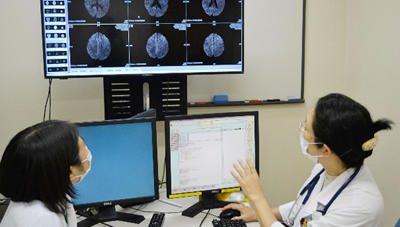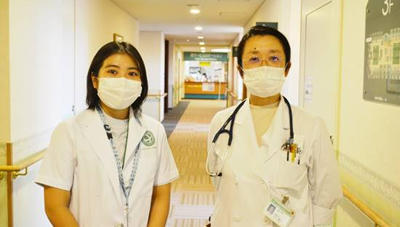School of Medicine at Narita
Faculty of Medicine
Clinical Clerkship Reports 2021

Supervisor report: IUHW Hospital, Neurology, Vice Manager Tomoko Ogawa
What do you expect student to do and to understand during the clinical clerkship?
Communicate with a wide range of people. Patients may be elderly, have dementia, hearing or sight impairments, aphasia or paralysis. They may be comatose or bedridden. The most important thing is to treat them with dignity and love, no matter what their condition.
Were there any occasions during the clinical clerkship when you felt that three years of education had paid off?
Many students were able to answer physiological and pharmacological questions with precision. I was impressed by their ability to understand the pathogenesis of neurological diseases. Some of the practical involved pathological dissections, but they were actively involved and I appreciated their willingness to work hard.
Were there any occasions in which you felt that students were able to make use of what they had learned about medicine in English?
When I taught them how to search for literature on the PubMed website, I saw that they were not allergic to English, and I realized that they were good at English.
How were the international students?
They are extremely talented students. They are interested not only in medicine, but also in the medical system and welfare system, and they show an attitude of wanting to play a role in the future of medicine.
What would you like to say to exam candidates?
As you can see from COVID-19 measures, medicine in the future will not be made up of only Japan.
Welcome
to International University of Health and Welfare, where students from all walks of life gather.

Student report: Yumiko Yoshida
What does a day in clinical clerkship look like?
A day in clinical clerkship varies considerably depending on the department in which you are practicing. There will be surgery observation and outpatient observation. At the Department of Neurology, we had a morning conference from 8:30am, rounds from 9:00am, courses from 10:00am, afternoon rounds and observation of procedures from 1:00pm, and a joint conference from 4:30pm.
Was there any particular occasion when you felt the achievement of students’ three years of study?
I think it was when I was able to conduct a medical interview smoothly. I felt the achievement of the three years of study the most.
Were there any occasions you felt you "grew up" during your clinical clerkship?
I think it's when I realized that in clinical clerkship, each department and each disease has its own key points to focus on.
Did you feel any difficulties during your clinical clerkship?
I was confused by the differences in the level and requirements of each department, and I was also confused about how to interact with the patients. I think the solution to these is to help each other and to ask your supervisor about things you don't understand as soon as possible.
About the environment during the clinical training (location of the hospital, living environment, living conditions, etc.)
IUHW Hospital in Nasushiobara is very close to the accommodation. Supermarkets and train stations are a bit
further away, but you can borrow a bicycle from your accommodation. Meals were provided by the hospital and
the accommodation, so we didn't have any problems.
In addition, each practice group was given a room in the
hospital and the library was also very well stocked with books in each department.
Clerkship Schedule
From May to October, I practiced at the following departments for a fortnight each: obstetrics and gynecology, pediatrics, respiratory medicine, respiratory surgery, neurology, neurosurgery, orthopedics and plastic surgery.



